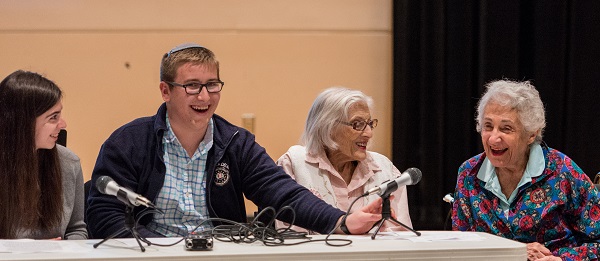
Pittsburgh teens connect with seniors through G2G podcast interviews
Above image: Leah Fireman (from left), Jacob Wiesenfeld, Ruth Ganz, and Doris Kennedy enjoy a laugh during a podcast interview.
As a young Jewish mother and wife in the 1960s, Margit Diamond and her family moved to the Chicago suburb of River Woods. The first Jewish family in town, they encountered anti-Semitism, with other parents forbidding their children from playing with the Diamond kids.
Diamond decided to take a proactive approach. She visited her neighbors to introduce her family and invited them over for a Jewish meal. While parents were hesitant, their children stopped by the Diamonds’ house for fresh cookies and lemonade. As the neighborhood kids warmed to the family, the minds of their parents opened as well.
“I find that story inspiring, especially in today’s world where there is so much immigrant talk and intolerance,” says Leah Fireman, 17, a junior at Pittsburgh Science and Technology Academy. “I love how simply the human connection of sharing a meal and opening your doors can bridge the differences we have.”
In stories like Diamond’s, teens and seniors in Squirrel Hill are finding a way to connect and bridge the generation gap.
Fireman is one of the students involved in G2G (Generation To Generation)/J Line, a joint program of the Jewish Agency on Aging and the Jewish Community Center of Greater Pittsburgh. Teens interview seniors at Weinberg Terrace retirement community to share their wisdom and experiences to young people still finding their way.
The JCC received a grant last summer to start a program that would connect high school students and seniors in the community, says Carolyn Gerecht, director of teen engagement and experiences at the Jewish Community Center of Greater Pittsburgh. The grant coincided with Rabbi Jeremy Markiz’s arrival in Pittsburgh.

“I showed up at the right time,” says Markiz, director of youth tefilla (prayer) at Congregation Beth Shalom in Squirrel Hill.
The JCC bought some equipment – laptops, microphones, digital recorders, windscreens and headphones. Markiz, a podcast enthusiast, jumped right in. The idea from the start was to let the kids own the project, he says.
“It’s been bottom up,” he says. “We try to give the teens as much leniency as we could.”
The teens spend an hour or so each Sunday on the podcast effort. They alternate between visits to the seniors at Weinberg Terrace and working on production at the JCC.
The program has been an opportunity for the teens to get out of their shells and learn about an older generation’s struggles, says Tanya Bielski-Braham, development and communications specialist at Jewish Association on Aging. The young people are learning how to conduct interviews with the seniors and find topics that are cultural and timely. For example, one of the conversations focused on what it means to be a mensch. Another interview concerned national headlines.
“And the seniors, their eyes light up,” Bielski-Braham says. “They love to share the stories of their youth, things they haven’t talked about in years.”
Ninety-year-old Doris Kennedy is pleased to be a part of the effort.
“You always learn something,” Kennedy says of the sessions with the next generation. “It’s nice to know that young people are interested in those who came before them. I do think it’s important.”
Jacob Wiesenfeld, 17, got involved because he saw value in the program’s dual benefits.
“The podcast is the auditory equivalent of a painting. It can be as complex or simple, short or long, as the creator wishes,” says Wiesenfeld, a student at Hillel Academy. “With the help of Rabbi Jeremy, we are traversing generations in search of stories. The podcast is our mode of travel.”
What’s proven to be a bit more difficult than the interviews is the production side of the program. At five months in, none of the podcasts has yet streamed.
“One thing we know now is how long it can take to compile the audio,” Gerecht says. “We had hoped to put out podcasts on a regular basis.”
But then, the appearance of podcasts on iTunes is not necessarily the measure of success for this program.
“The podcasting is secondary to the relationships between the teens and seniors,” Bielski-Braham says.